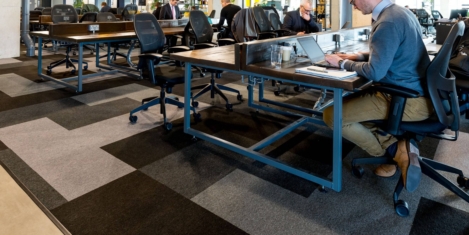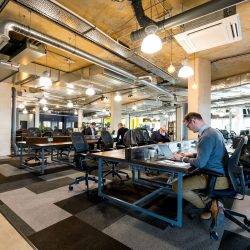September 19, 2018
The main challenge of modern working life: finding the place just right to meet 0
 Every physical setting sends distinct signals to meeting participants – signals that set the tone and provide a context for the conversation, even when they are subtle or not in anyone’s conscious awareness. You understand instinctively that the place where a meeting occurs has an impact on the nature of the conversation. Just imagine the difference between a conversation around a large formal conference table with expensive executive chairs and one that takes place in an informal employee lounge, with the participants seated in a circle on soft bean-bag chairs. (more…)
Every physical setting sends distinct signals to meeting participants – signals that set the tone and provide a context for the conversation, even when they are subtle or not in anyone’s conscious awareness. You understand instinctively that the place where a meeting occurs has an impact on the nature of the conversation. Just imagine the difference between a conversation around a large formal conference table with expensive executive chairs and one that takes place in an informal employee lounge, with the participants seated in a circle on soft bean-bag chairs. (more…)















 More SMEs than larger businesses offer flexible working as a way of reducing absences, research from industry body Group Risk Development (GRiD), suggests. The research showed that 35 percent of SMEs with up to 249 employees are actively using flexible working strategies to combat absence compared to just 23 percent of organisations with over 250 employees. Drilling down further into the detail, 38 percent of micro businesses with between 1 and 9 employees use flexible working as a means to reduce absence. Flexible working now means a lot more than allowing an employee to work from home when they are feeling under the weather, and following changes in the law in 2014, it is now an option for everyone with at least 26 weeks continuous employment to request it – not just those with children or carer responsibilities. It also includes part-time working, term-time working, job sharing, compressed hours and flexitime. A greater degree of flexibility can increase productivity and reduce burn out, particularly in stressful occupations.
More SMEs than larger businesses offer flexible working as a way of reducing absences, research from industry body Group Risk Development (GRiD), suggests. The research showed that 35 percent of SMEs with up to 249 employees are actively using flexible working strategies to combat absence compared to just 23 percent of organisations with over 250 employees. Drilling down further into the detail, 38 percent of micro businesses with between 1 and 9 employees use flexible working as a means to reduce absence. Flexible working now means a lot more than allowing an employee to work from home when they are feeling under the weather, and following changes in the law in 2014, it is now an option for everyone with at least 26 weeks continuous employment to request it – not just those with children or carer responsibilities. It also includes part-time working, term-time working, job sharing, compressed hours and flexitime. A greater degree of flexibility can increase productivity and reduce burn out, particularly in stressful occupations.
 Most organisations already offer some sort of flexible working and over half of employees now ask to work flexibly, a new survey from XpertHR research has claimed. One in 12 organisations (8.1 percent) reported that all employees worked flexibly, with employers attributing the rise to a more supportive workplace culture and the impact of recent legal changes. The survey found that more than half (55.9 percent) had seen an increase in flexible working requests over the past two years. Three out of four believed that this was due to changes in workplace culture in recent years, attributable in part to a change in the law in 2014 that extended the right to request flexible working to all employees with at least 26 weeks’ service. Flexible working goes across the board, and includes part-time working, variable start and finish times, home-working and other options.
Most organisations already offer some sort of flexible working and over half of employees now ask to work flexibly, a new survey from XpertHR research has claimed. One in 12 organisations (8.1 percent) reported that all employees worked flexibly, with employers attributing the rise to a more supportive workplace culture and the impact of recent legal changes. The survey found that more than half (55.9 percent) had seen an increase in flexible working requests over the past two years. Three out of four believed that this was due to changes in workplace culture in recent years, attributable in part to a change in the law in 2014 that extended the right to request flexible working to all employees with at least 26 weeks’ service. Flexible working goes across the board, and includes part-time working, variable start and finish times, home-working and other options.


 New research has revealed the top 15 cities worldwide that are best for remote working and Prague is on top, with London ranked as the 5th best city in the world for remote workers. Inspired by the top 15 cities listed in InterNation’s Expat City Ranking Report, Powwownow analysed the cost of living, average monthly salary, internet speed, price of coffee, and cost of public transport in different places across the world. Cities were individually scored on each factor and ranked by the total number of points, to calculate the top 15 cities around the world. Calculating an overall ranking for each city, Prague was revealed to be the best city worldwide for remote workers.
New research has revealed the top 15 cities worldwide that are best for remote working and Prague is on top, with London ranked as the 5th best city in the world for remote workers. Inspired by the top 15 cities listed in InterNation’s Expat City Ranking Report, Powwownow analysed the cost of living, average monthly salary, internet speed, price of coffee, and cost of public transport in different places across the world. Cities were individually scored on each factor and ranked by the total number of points, to calculate the top 15 cities around the world. Calculating an overall ranking for each city, Prague was revealed to be the best city worldwide for remote workers. 














June 17, 2018
Fathers Day offers a chance to ponder the disadvantages faced by many working dads
by Julia Waltham • Comment, Flexible working, Wellbeing
(more…)